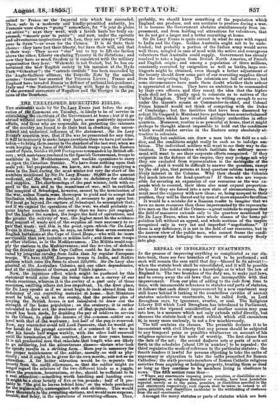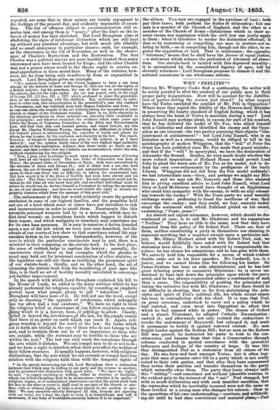REPEAL OF INTOLERANT ENACTMENTS.
Ix the process of improving anything BO complicated as our sta- tate-book, there are two branches of work to be performed ; add such will remain the ease until that day—blessed be its advent!— when the statute-book shall be consolidated, and it will be possible for human intellect to compass a knowledge as to what the law of England is. The two branches of the duty are, to make just laws, and to sweep away the old laws that are incompatible with that improvement. From our plan of adding to the code from time to time, with innumerable references to statutes and parts of statutes, it follows that each direct improvement by a new enactment may still leave behind it lurking in the numberless cavities of ancient statutes mischievous enactments, to be called forth, as Lord Brougham says, by ignorance, avarice, or zeal. The Religious Liberty Bill which Lord Brougham has introduced to Parliament, and which the ripened consideration of another session may paw into law, is a measure which not only extends relief directly, but cleanses the statute-book of much rubbish which still encumbers it, in many cases uselessly, in not a few mischievously.
The bill contains six clauses. The preamble declares it to be inconsistent with civil liberty that any person should be subjected to any temporal pains or penalties whatsoever on account of his religious opinions or his mode of worship. The first clause fixes the date of the act ; the second declares acts or parts of acts set forth in the schedules [about 120 in number] to be repealed ; the third'regulates the mode of reference to the particular statutes ; the fourth renders it lawful for persons objecting to take the oaths of supremacy or abjuration to take the oaths prescribed for Roman Catholics; the sixth prevents members of Roman Catholic religions societies from acquiring or holding property, treating them as dead so long as they continue to be members living in obedience to vows. The fifth section runs thus— "Where any enactments imposing pains, penalties, or disabilities on ac- count at religion, or religious discipline or worship, have been heretofore repealed merely as to the pains, penalties, or disabilities specified in the said enactments respectively, such repeals shall be taken to extend to all pains, penalties, and disabilities incidental to the withholding of obedience from the said enactments."
Amongst the many statutes or parts of statutes which are here
rapealed, are some that in their nature are totally repugnant to the feelings of the present day, and evidently impossible of execu- tion. The list of offences subject to excommunication still re- mains law, and among them is "usury," after the limit on the in- terest of money has been abolished. But Lord Brougham aims at abolishing the signs of intolerant distinction which are still kept up without any practical advantage, but with much idle ribaldry and no small annoyance to particular classes; such, for example, as the observance on the 5th of November, as well as the observ- ance of Charles's Martyrdom and the Restoration. The first Charles was a political martyr not more harshly treated than many uncrowned men have been treated by kings; and the other Charles was not a person whose recall to the throne ought to receive an- nual approbation in these moral days. .Many of the statutes, how- ever, are far from being only vexatious in form or impractical in result. Lord Brougham gives an example.
"If a natural-born subject of the Crown happens to have a son born abroad, by the statutes of Anne and George IL that son has all the rights of a British subject ; but his grandson, the son of that son so naturalized by the statute, has not the same rights. An act was passed early in the reign of George III. (13 Geo. III. e. 127) which professed to place the grandchil- dren on the same footing with the children. But, unfortunately, by refer- ence to other acts, this naturalization in the grandchild's case was confined to Protestants, and was withheld from both Roman Catholics and Jews; for no one can claim the benefit of the act without taking the sacrament in some church or chapel of the Protestant worship. There is no little obscurity in the statutory provisions on these subjects—an obscurity little creditable to our principles; and whoever examines the evidence taken some years ago before the Rouse of Commons Committee on the Alien and Naturalization Law, will find that able and learned person, and sound lawyer, my late friend Mr. Charles Williams Wynne, describing the difficulties in which he felt himself placed in administering the concerns of wards and others for whom he was trustee, by the confusion and obscurity in the law. The result, however, of whatever examination you give to the subject, is as I have stated it ; and the opinion lately taken of the very highest legal authority on subjects orthis description, declares that there exists no doubt on the matter, and that neither Jew nor Catholic can be naturalized, under the acts, without abandoning his own religion. "Now, IT pray your Lordships to mark what is the consequence of leaving such laws on our statute-book. The late Duke of Gloucester was born at 'Rome; the present Duke of Devonshire at Paris; both were naturalized by the statutes of Anne and George IL; and if either had a eon also born -abroad, the act of George LIL applied, and naturalization was effected, be- eause in their case there was no difficulty in taking the sacramental test. But how would it be if the Duke of Norfolk had been born abroad and his son also ? The Duke would be naturalized ; his heir-apparent could not be, 'unless be did what all who know that able and excellent individual must be aware he would not do, declare himself a Protestant by taking the sacrament in one of our churches ; and thus he would forfeit the right to inherit the princely domains which form the apanage of this great title."
The enforcement of this law would evidently create the greatest confusion in some of our highest families, and the penalties held out are of a kind which must at times have put travellers to risk and inconvenience in order to avoid them. Enactments like this -resemble poisoned weapons laid by in a museum, which may in- ilict fatal wounds on incautious hands which happen to disturb their repose, and which malignity or treachery may sometimes use for its own base purposes. It is easy to conceive a fiction founded upon a use of the law which we have just seen described, but the .annals of our courts of law show us that sometimes actual life may -emulate fiction in it intrigues. Independently, however, of the uses to Which the particular enactments may be put, there is a mischief in their remaining on-the statute-book. In the first place, the mass' of rubbish-helps to confuse the lawyer ; secondly, the enactments stand there as, bad examples which the pleader.in tourt may hold out-for intolerant construction of other statutes or the legislator can still cite them as testifying the prominent spirit of our statute-book ; thirdly, and on the other baud, the act of .cleansing the statute-book from the mouldering of past ages like this, is in itself an act of healthy morality calculated to encourage "yet further improvement. In the speech with which Lord Brougham explained his bill to the House of Lords, he added to the many services which he has :already performed for religious equality, by recording an emphatic _protest upon what people please to call "toleration." Lord .Brougham will have none of it. He will not use the word, except "only as denoting " the opposite of intoleran,ce, which unhappily has too often hadsa real existence!! We have no right to treat
be religious belief or observance of our fellow creatures as some- .
g Which it is' is favour,. boon, •o privilege tiallow. Clearly,
lief is beyond: thinterterence,pf the law, for the,simple reason at there is no power on earth wh,icli can reach it... Again, reli- ,gious worship is .beyond the reach of the law : the forms which set it forth are trivial in the eye of those who do not belong to the sect, and to restrain them can be of no importance to those who 'are outside, while the restraint may be terrible to those who are within the sect." The law can only reach the conscience through the acts which it diotates. We can compel men to do or not to do ; and we have a right to interfere when theiracts affect the welfare of their fellow creatures. It usually happens, however, with religious distinctions, that the acts which we can restrain or compel have less relation with the religious faith than with the temporal rights of
• In the speech introducing his bill, Lord Brougham drew a distinction between that which may be trifling to one party and the reverse to another, and he presented this distinction with great force. "We have no right," he said, "to regard anything as trifling, either in doctrine or discipline, Which our fellow Christians hold to be momentous—whether it be matter of religious dogma, or of ecclesiastical observance—as that the priest shall torn his face to the altar or avert it, shall read in one part of the church or ano- ther, with or without lights, or hare a stone placed in one portion or ano- ther. We may ourselves entirely disregard all this, because not agreeing with our views, but I deny the right to treat it as insignificant and call it mummery, if any body of worebipemeineerely believe it to be important." the citizen. Two men are engaged in the purchase of land ; both pay their taxes, both perform the duties of citizenship ; but one man is a member of the Church of England, and the other is a member of the Church of Rome—distinctions which in their es- sence escape any cognizance which the civil law can justly apply to them : when it interferes to render the distinction effectual, it does so by restraining or compelling one man in matters not re- lating to faith,—as in compelling him, though not the other, to re- gister the acquisition of land. That is intolerance : the opposite, "tolerance," means that he shall have the favour of equal justice, —a statement which reduces the profession of tolerance ad absur- dum. Our statute-book is tainted with this depraved morality ; it is encumbered by the consolidated bigotry of ages, left by slovenly reformers : Lord Brougham proposes to cleanse it and the national conscience in one wholesome statute.



























 Previous page
Previous page